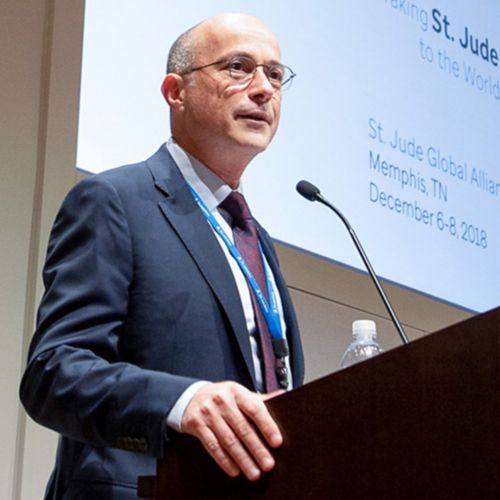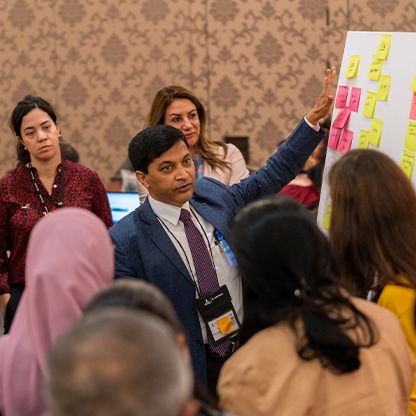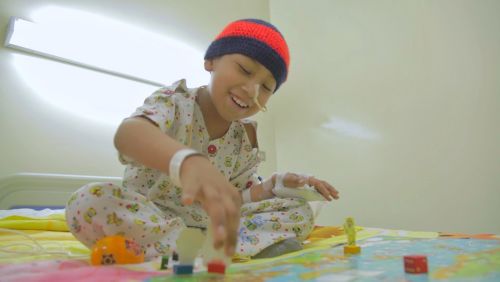St. Jude Family of Websites
Explore our cutting edge research, world-class patient care, career opportunities and more.
St. Jude Children's Research Hospital Home

- Fundraising
St. Jude Family of Websites
Explore our cutting edge research, world-class patient care, career opportunities and more.
St. Jude Children's Research Hospital Home

- Fundraising
Global Scholars: Dr. Sanjeeva Gunasekera
Other Global Scholars Projects:
Dr. Gunasekera focused on removing barriers to medicine access
As a naturally inquisitive child Dr. Sanjeeva Gunasekera always gravitated toward the sciences.
“I probably knew I’d [grow up to do] something related to science,” he says.
Gunasekera has done just that. He became only the second board-certified pediatric oncologist in his native country of Sri Lanka. There, he is a pediatric and adolescent oncology consultant at the National Cancer Institute, which includes Sri Lanka’s only dedicated pediatric oncology treatment centre.
As a Global Scholar, Gunasekera is building soft skills to complement his years of clinical training. He is also pursuing the answer to a question that has captured his attention: How can we improve access to essential pediatric oncology medicines in low- and middle-income countries?
Gunasekera’s Global Scholars Project aims to answer that question and find solutions.
"Especially when it comes to pediatric oncology, [the lack of access to essential medicines] has not been explored enough,” he says. “My research will focus on several key areas. One will be quantifying the problem. Then identifying reasons for unavailability of medicines and understanding barriers and facilitators that exist in translating existing policies into practice when it comes to essential medicines availability.”

“. . . starting a program requires finding resources and building a team. You also need advocacy skills to convince people such a program is needed and should be established. Then comes finding the resources to sustain the effort.” -- Dr. Sanjeeva Gunasekera
As part of his project, Gunasekera is reviewing international literature and policy frameworks to identify the strategies and processes other countries have tried. “The ultimate objective,” he says, “is to provide a possible mechanism [through which] Sri Lanka’s essential medicine shortages and stockout issue can be addressed in a systematic manner.”
Learning to take on such policy and advocacy issues was one of his goals when he applied to the Global Scholars Program.
Previously, Gunasekera focused on his clinical knowledge and skills. His efforts included two years as a fellow at the Birmingham Children’s Hospital in the United Kingdom, where he worked in pediatric hematology, oncology and bone marrow transplantation. The fellowship boosted his confidence and gave him the chance to see how some of the world’s best pediatric hematology-oncology providers operate.
“But when I came back to Sri Lanka and tried to build on the existing resources and develop a full-fledged childhood cancer program, I realized clinical skills only get you up to a certain [point],” he says. “Equally or more importantly are the skills that enables us to build a business case for investment, lobby government and nongovernmental organizations and be effective managers.”
For example, as a fellow, Gunasekera learned how to conduct bone marrow transplantation, including patient assessments and follow up. But Sri Lanka lacks bone marrow transplantation programs.
“Having [clinical] skills might be good enough to run an existing program,” he says. “But starting a program requires finding resources and building a team. You also need advocacy skills to convince people such a program is needed and should be established. Then comes finding the resources to sustain the effort.”
And so, the doctor who grew up fascinated with science and the pursuit of answers is looking for answers for a new set of problems: Why are there shortages of critical, essential medicines? How should the need for pediatric oncology research data be addressed? What is next for Sri Lanka’s one, dedicated pediatric oncology unit?


